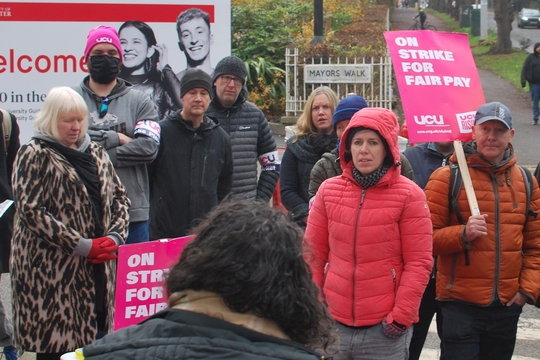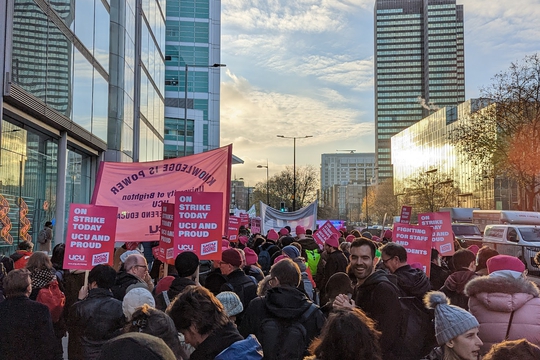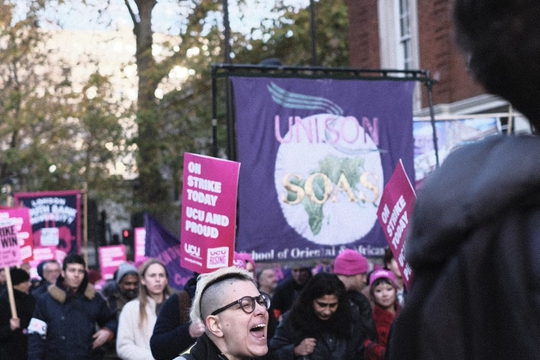What the hell is going on?
by
Socialist Alternative members in UCU
December 18, 2022
Featured in Hot Strike Summer: View from the Picket Line (#15)
Next steps in the UCU Higher Education dispute

bulletins
What the hell is going on?
by
Socialist Alternative members in UCU
/
Dec. 18, 2022
in
Hot Strike Summer: View from the Picket Line
(#15)
Next steps in the UCU Higher Education dispute
This article was first published in Socialist Alternative, and is republished here as part of the debates on the way forward in the UCU dispute.
Following the UCU General Secretary’s recent video announcing plans for a marking and assessment boycott and attacking the Higher Education Committee’s resolution to take indefinite strike action, we wish to share our views on UCU democracy and next steps in the Higher Education #UCURising dispute.
After winning our national ballot and taking three initial strike days this term, followed by protests throughout the country on 30 November, the mood among members seemed high. However, with the recent cancellation of negotiations between the employers’ association and the joint campus trade unions, and UCU members waiting anxiously for the announcement of next steps in our disputes, the General Secretary Jo Grady’s latest announcement has come as a bombshell.
In one breath, the GS announced that UCU’s Higher Education Committee (HEC) had voted for a marking and assessment boycott to begin in January and an all out strike and indefinite strike action to begin in February. This strategy was revealed to members for the first time – despite HEC members having taken this decision six weeks earlier.
Strike strategy lacking
In her announcement, Grady complained that she was blocked from participating in discussions at the NEC. However, this appears to refer to a June decision to save time at meetings by asking the GS to submit a report in advance and take questions and answers on the day, rather than delivering a lengthy report. Grady went to disagree with the strike strategy that HEC voted for and announced that she would be convening a Branch Delegate Meeting on 10 January to consult members on her own proposals, including “blocks of action”, re-ballots, and “delivering a dynamic media strategy”. This latter proposal is already failing, as the Times Higher Ed ran a story about division within the union immediately after Grady’s announcement, playing into the hands of our employers.
This is not the first, second, or even the third time that the GS has attempted to derail a strategy that she disagrees with by unexpectedly forcing a vote on an “alternative strategy” to members. In 2020, Grady convened spur-of-the-moment meetings to put forward the employers’ insulting 1.8% pandemic pay offer. After branch delegates voted it down, the GS refused to accept their decision but instead forced a second vote to members on the offer (it was voted down a second time).
This pattern has continued up to the most recent ’12-18 month roadmap’ suddenly proposed by Grady in the last dispute, which was again voted down by delegates. In every instance, members have rejected the GS’s proposals, but lost valuable time and momentum which could have been devoted to organising against the employers.
However, the lesson from this particular botched strategy announcement is that we must circumvent the GS’s machinations. The HEC, having voted through a marking boycott and indefinite strike action on 3 November 2022, should have rejected the bureaucracy’s legally specious demand for confidentiality and delaying tactics, and immediately informed members of this momentous decision. While the strategy accorded with what many rank and file activists had been calling for and what we feel is necessary to win these disputes (as we will discuss), industrial action is not a static process and it has to be built towards collectively.
Any sense that it is a top-down or undemocratic decision being imposed upon members demoralises members and reduces the likelihood of effective action. Grady’s announcement has now struck a double blow: first shocking members that a strategy has been decided without their knowledge, then secondly suggesting that UCU lacks her support in taking serious action.
It is notable, however, that part of the reason these decisions were taken by HEC and not put to members is that the last branch delegate meeting was a highly controlled affair with predetermined questions that did not include indefinite strike, despite several large branches (e.g. Leeds, Manchester) voting in favour of some form of indefinite strike action at branch meetings.
It therefore seems highly hypocritical for the GS to cite a lack of member consultation around this key proposal, when it was her office that was responsible for putting the options to members and running the consultation. Unfortunately, UCU Left and the UCU Solidarity Movement also did not use their large public platforms to build support for indefinite strike action (despite some of their members sitting on HEC and voting for it).
With the disputes still progressing and our mandate running out, all eyes are now on the Branch Delegate Meeting on 10 January. We must ensure that a clear mandate for action emerges from this meeting and that members feel united to carry out the action that will win these disputes. Despite the strategic blunders from every level of union leadership, we still believe it is necessary to organise for indefinite strike action, but this must be built and prepared for democratically if it is to succeed, beginning now. We also must ensure that the BDM is a real chance to set out a strategy rather than stage managed by the bureaucracy.
Why do we believe indefinite strike is our best shot of winning the dispute?
Taking blocks of strike action in the past has allowed employers to recover and demand that work be made up, all while they pocket our salaries in strike deductions. Employers cannot mitigate an entire term’s worth of teaching, research and admin wiped out. They would be forced into offering student refunds and other dire consequences – precisely what we need to get a real offer out of them. In recent HE strikes in the USA, such as the 10 weeks taken by Columbia University graduate teaching assistants and 25 days by precarious adjunct workers at The New School, battles have been won only after protracted periods of strikes that threatened students’ ability to progress or graduate.
It is additionally important to point out that due to the structures of US HE unions, these workers and their strikes did not cover the entirety of those delivering teaching. Columbia, for instance, employs many permanent faculty who were not part of the strike. Nevertheless, despite these limitations on union density, workers withdrew enough labour to significantly derail the semester. This is the goal we have to meet.
Can we ‘afford to strike’?
We know from experience that our employers are determined to crush us. While our impressive mandate and first three days of action brought them to the table, they’ve now wasted an entire meeting demanding that we rescind strike action without even tabling an offer. We simply cannot get them to budge without a serious show of force.
As candidate for national treasurer and Socialist Alternative member James Brackley has shown, UCU has significant reserves to support sustained strike action. Whilst spending our reserves is always a risky move, this is a make-or-break moment both for our union and for the trade union movement more broadly and we cannot think of a more opportune time to fully exercise our industrial strength.
This is not to say we’re proposing that the strike necessarily last the entire term. The point is to strike until the employers table an offer we can accept. Potentially this may cost members less than the previous rounds of strike, which have led to weeks of lost pay with nothing to show for it. (We took 18 days of discontinuous action in 2021/22 and won nothing; barristers took 25 days of indefinite action this year and won a 15% pay rise). Some casualised staff have been hit particularly hard by blocks of action scheduled on their teaching days and have been leading the call for indefinite action.
Those advocating a marking boycott as an alternative to indefinite strike are advocating for a less powerful tactic that puts members with marking duties at significantly greater risk than the rest of the membership. Furthermore, retaliation and potential pay deductions in response to the marking and assessment boycott may force our hand into strike regardless, as some employers threaten to deduct 100% of our pay for every day we do not turn in marks.
Although our current mandate is awkwardly timed because it expires before Spring assessments, we need to use it. Members voted in favour of strike action to resolve this dispute, not for Twitter campaigns. They will not be motivated to participate in a re-ballot if we squander our current mandate. Moreover, indefinite action compensates for the poor timing of this mandate. Employers understand that if Spring term is canceled, then there is no learning from it to assess.
No more tokenistic action!
For those who suggest we cannot afford to strike, we should point out that with constantly deteriorating pay, pensions, and working conditions, we cannot afford not to strike. With employers demonstrating their recalcitrance again and again, we have no choice but to bring the fight to them for the sake of making our own futures liveable and to preserve the future of our sector. But these dynamics are not confined to UCU.
Workers in all sectors are striking, forced by the cost of living crisis, decades of stagnant and decreasing pay, deteriorating work conditions, and skyrocketing inflation. Facing hostility from both the Tory government and the Labour Party leadership, trade unions have offered the only path forward – only to bring workers into conflict with the leadership of their own unions.
However, the momentum driving the current strike wave will not be stopped by the bureaucracy. We must combine the struggle for rank-and-file democracy in the trade union movement with our struggles to win our demands.
A Branch Delegate Meeting Is scheduled for 10 January, which will inform the decisions the HEC takes on 12 January. It is essential that we ensure there is real discussion of the indefinite strike plan at this Branch Delegate Meeting, and that rank and file pressure ensures that we continue with the plan for indefinite action – we simply cannot afford more tokenistic action, we have to fight to win. In addition to this, rank and file meetings and debates are taking place to help inform and build the confidence of our members, something that we welcome.
Subscribe to Notes from Below
Subscribe now to Notes from Below, and get our print issues sent to your front door three times a year. For every subscriber, we’re also able to print a load of free copies to hand out in workplaces, neighbourhoods, prisons and picket lines. Can you subscribe now and support us in spreading Marxist ideas in the workplace?
Read next

How to Stop a University
by
Zara Dinnen,
James Eastwood
/
Dec. 18, 2022

